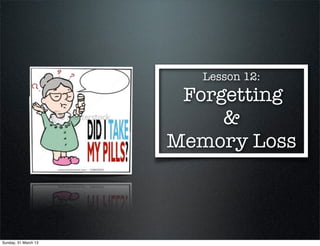
Lesson 12 forgetting & memory loss 2013
- 1. Lesson 12: Forgetting & Memory Loss Sunday, 31 March 13
- 2. Outcomes: •Describe the strengths and limitations of the psychological theories of forgetting: - Retrieval failure theory including tip-of-the- tongue phenomenon - Interference theory - Motivated forgetting as informed by the work of Sigmund Freud including repression and suppression - Decay theory Sunday, 31 March 13
- 3. What is Forgetting??? Failure to access or retrieve information previously stored in memory Sunday, 31 March 13
- 4. Forgetting something DOES NOT mean it is gone FOREVER, but simply at that moment in time you can not retrieve the information. HY do we So W forget? ??? Sunday, 31 March 13
- 5. Retrieval Failure Theory Forget because fail to use the right retrieval cue Retrieval cues are mental reminders; context dependent cues (context or environment memory was encoded) and state dependent cues (smell, taste and sounds associated with the encoding of the memory) Retrieval of memories are enhanced when remembering occurs in similar surroundings as when the memory was encoded IS STUDYING WHILST LISTING TO YOUR IPOD SUCH A GREAT IDEA??????? Sunday, 31 March 13
- 6. Tip-of-the-tongue phenomenon Sunday, 31 March 13
- 7. Remember this number 9458 2329 Sunday, 31 March 13
- 8. Spend 30 sec remembering the following 9876 5432 97005731 9345 6894 9354 6823 Sunday, 31 March 13
- 9. TRY TO RECALL ORIGINAL NUMBER Sunday, 31 March 13
- 10. 9458 2329 Sunday, 31 March 13
- 11. That was an example of retroactive interference. Where new information interferes with the ability to remember old information. Sunday, 31 March 13
- 12. Interference Theory Forget because other memories interfere with the one we are trying to retrieve, particularly those that are similar to the one we are trying to recall Retroactive interference – New information interferes with the remembering of old information Proactive interference - Old information interferes with ability to remember new information Sunday, 31 March 13
- 13. Sunday, 31 March 13
- 14. Limitations - Interference Theory Research supporting the theory tends to only show interference with the recall of meaningless information. It has yet to explain why interference does not effect semantic memories Sunday, 31 March 13
- 15. Motivated Forgetting Theory proposed by Sigmund Freud Forget because we want to forget, defense mechanism that protects us from distressing memories. Information not lost but hard to retrieve during normal waking consciousness Motivation can also lead us to recode distressing memories as more pleasant Repression - subconscious defense mechanism Suppression – conscious choosing not to think Sunday, 31 March 13
- 16. Limitations - Motivated Forgetting Repressed memories is a highly controversial topic. There mere existence is questionable creating doubt in the validity of Freud’s research. Sunday, 31 March 13
- 17. Decay Theory Forget because memory fades over time due to misuse Based on assumption that memory is stored as a physical or chemical trace in the brain Sunday, 31 March 13
- 18. Limitations - Decay Theory Extremely difficult to empirically test theory Does not explain sudden recollection of memories ‘forgotten’ Fails to explain the strength of the LTM retrieval of the elderly Sunday, 31 March 13